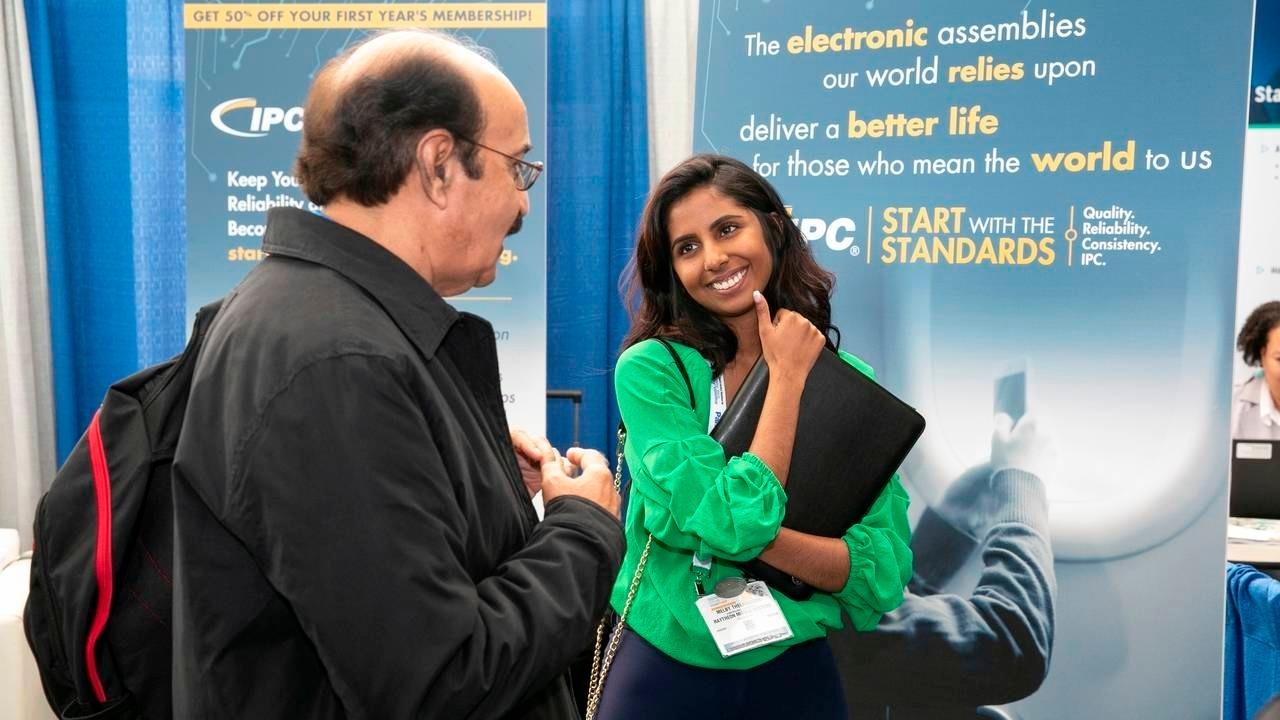Tips for Young Engineers

Melby talks with IPC Emerging Engineer Mentor, Vijay Kumar
The IPC Education Foundation (IPCEF) works to prepare students for rewarding careers by supplying learning opportunities focused on electronics manufacturing and improving the perception of manufacturing as a stable and well-paid sector. Sometimes the best learning opportunity comes from individuals immersed in manufacturing careers. IPCEF staff gained insight into the industry by speaking to professional engineer and IPC Emerging Engineer Melby Thelakkaden about her career path.
Melby Thelakkaden is a process engineer at Raytheon Missile Systems. She was born in the United Arab Emirates and raised internationally, spending time in Abu Dhabi, India, and Arizona. Thelakkaden graduated cum laude with a bachelors in Material Science & Engineering and recognized as an impact award recipient in which she was one out of ten graduates recognized on stage at graduation for exemplary leadership qualities and contribution. Soon after graduation, she moved to Tucson, Arizona to work at Raytheon Missile Systems where she is an Electro-Optics Process Engineer.
We asked Thelakkaden questions about the electronics manufacturing industry, tips for career advancement within the industry, and key strategies to prepare for landing a dream job.
 IPCEF: What steps and actions led to your career at Raytheon?
IPCEF: What steps and actions led to your career at Raytheon?
MT: “I was actively involved in school, between clubs, research, and on-campus jobs. I was actively involved in numerous clubs including vice-president of Challah for Hunger, which is a Jewish community service centered club which worked to prevent hunger. I was the president of the ASU Material Advantage chapter which is a student-centered club for engineers who wanted to get a further in-depth understanding of materials in real-world applications. I was the outreach coordinator of the Society of Women Engineers, a club that brings together members who share diverse experiences in STEM. I also participated in Feed My Starving Children which is an organization dedicated to providing nutritious meals to children worldwide.
While it’s important to participate in extracurricular activities, it is also important to apply the knowledge you gain from your coursework to real-world applications. I got involved in research early on and from there I attended technical conferences and worked on my public speaking abilities through poster presentations.
I had numerous leadership roles/jobs in engineering classrooms consistently each year, as well. These roles ranged from Engineering Section Leader, Undergraduate Engineering Teaching Assistant to Wellness Ambassador and Recovery Rising Ambassador. These roles helped me develop as a leader and ignited an interest in developing grit (perseverance and passion for long-term goals) within students, especially those who were struggling.”
IPCEF: You are one of IPC’s Emerging Engineers. Why did you decide to get involved? What are the benefits?
MT: “I got interested in the Emerging Engineer Program because I wanted to participate and be more closely involved in the development of IPC standards. Early in my career, I frequently found myself referencing various IPC documents. My mentor, Kathy Johnston, encouraged me to enroll in the program and after attending a couple of conference sessions, it became clear that being involved will help raise industry awareness. It’s such a great opportunity to represent Raytheon at this international platform.
IPCEF: You are an Electro-Optics Process Engineer - What do you love about your job?
MT: “I really enjoy learning about lean manufacturing. This business philosophy is highly successful in reducing costs, eliminating waste, increasing productivity all while maintaining high levels of quality. This methodology also helps significantly increase profits. There’s always processes that need improvements, so it’s interesting to learn new methods to implement.”
IPCEF: What makes the electronics industry exciting?
MT: “Your career can be so open-ended. You really hold the reins on it, and your career is what you make of it. As I see it, there are three ways to excel in your career:
- Certifications/Additional Training: There are many certifications and additional training that can complete to further prove your qualification and make you stand out from other engineers. Say that you want to be more involved in manufacturing, you could go for your six sigma belts that range from black belt to white belt, each increasing in the complexity of the project, range of project portfolio and data collection necessary. Not only does this certification give you more exposure on running on lean principles, but it also looks great on a resume and opens doors to new opportunities geared specifically to six sigma.
- Higher education: Most commonly, engineers pursue a Masters in Business Administration (MBA) degree or Masters in Engineering Management. Both degrees are similar in many ways, with an emphasis in different areas. It really depends on the direction you want to go and whether you want to stay focused on the technical aspect of your job or more managerial roles.
- Diverse work experience: As a process engineer, I focus on optics portion of the deliverable product. However, my experience is not limited to just the processes involved in the build. I have insight into our budget and yearly spending, exposure to quality/risk management as well as experience in production control and daily inventory management. If I were to look into a different opportunity, I would consider looking into one of these areas, since that is where I believe I can be a valuable asset and also diversify my work experience.
Personally, my goal is to gain experience in different roles and have the knowledge to accompany my work experience to be an invaluable asset to my employer.”
IPCEF: What suggestions do you have for students to consider when looking for new opportunities?
MT: “I went to all the career fairs in college, every single year, twice a year -- in the spring semester and once in the fall semester. It is especially important to attend as many career fairs as possible to avoid waiting until graduation to begin the job application process. From my past experiences, internships are the best way to make the transition into full-time job opportunities. Needless to say, the more internship experience (whether it be within the same company or different companies), the higher the likelihood of creating a network that you can turn to for job opportunities. The best time to begin searching for an internship is right before you begin your junior year, in my opinion. This gives you about two years before graduation to find competitive internships. While many think this may be too early, it is important to realize some companies hire their interns for the summer months in advance.”
IPCEF: What advice do you have for young professionals, especially students in finding a job?
MT: “Simply put, it takes three straightforward steps, each requiring more specific, targeted focus:
- Prepare yourself: Every university has a career services center that specializes in resume workshops, elevator pitches and other associated sessions. Make a blanket resume that applies to the most common jobs. Later use this general template and tailor it to specific job requisitions.
- Prepare for career fairs: Do some research in advance. Look for jobs online, have specifics in mind, but keep an open mind for what a recruiter may suggest. While you know best what your skills and capabilities are, be open-minded to other suggestions.
- Prepare for specific companies: Look at background information of company products, the different company sites and what each role calls for. Find key things you like about the company and identify key skills that may be an asset to the role that you are pursuing. Most importantly, tailor your resume to the role you are seeking – most people fail to do so. Always be prepared to present your elevator pitch (a quick synopsis of your background and experience).
IPCEF: What can a student do to prepare for that interview?
MT: “Visit Glassdoor for some insight on the internship/job. Some postings include sample interview questions. Use your resume as a tool to compare your unique experience to some of the general questions. This will help create a connection with past experiences, whether they be situational or technical, and the general questions that most interviewers ask. A strong candidate will also be knowledgeable about the company and the role, so use the company website as tool, as well.
And while it is common to chase big name companies, see if their location is desirable. It’s not all about the money, take consideration into the company’s location -- whether you prefer commute time, number of other job opportunities, weather etc.”
IPCEF: You were involved as a volunteer and group leader at the IPC APEX EXPO STEM Outreach Event for high school students within the San Diego area. Why do you think these events are important?
MT: “It was great to see IPC engaging high school students involved in hands-on soldering and show floor exhibitions. In high school, I had no idea nor direction on what career path I wanted to pursue. For students, this event exposes them to not only current technologies but future technologies as well. I think the event engages future engineers and provides them insights on industry practices.”
IPCEF: Thanks for your time and we’re looking forward to seeing you at IPC APEX EXPO 2020.
MT: “See you there!”


